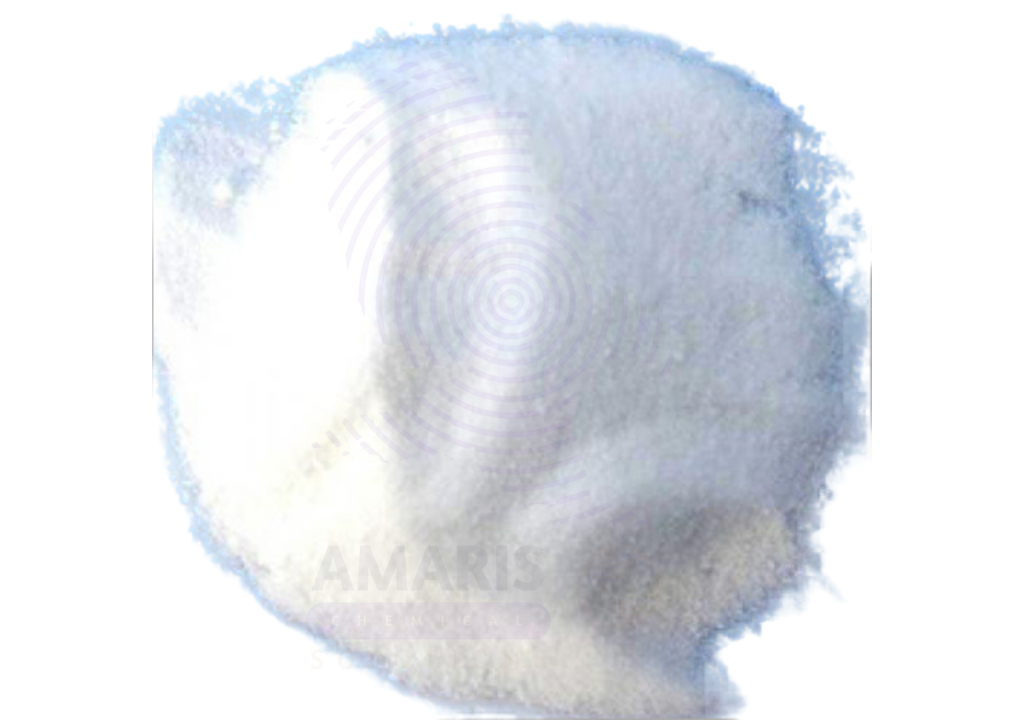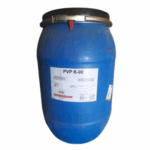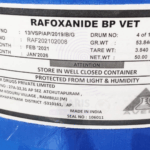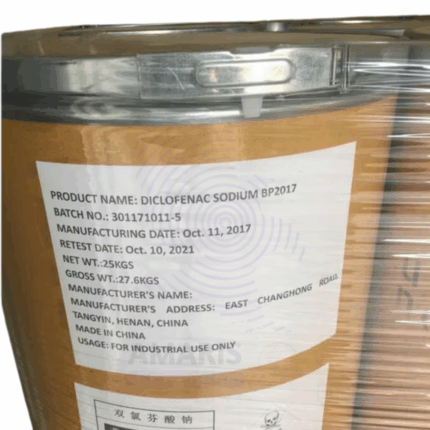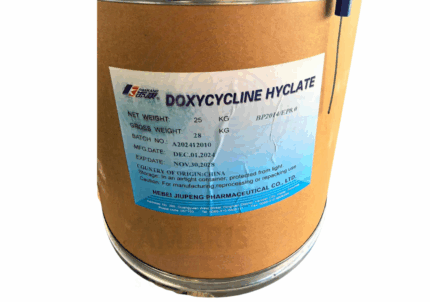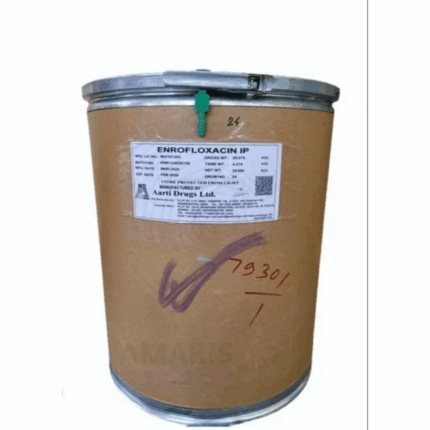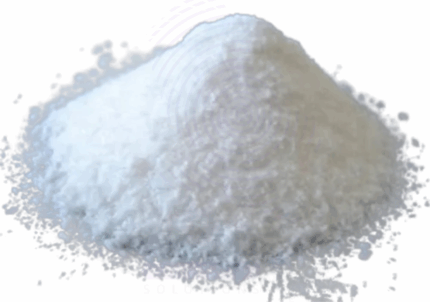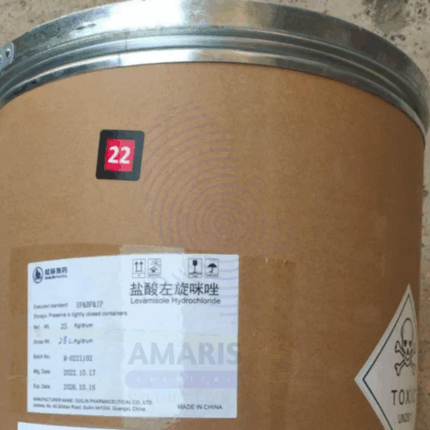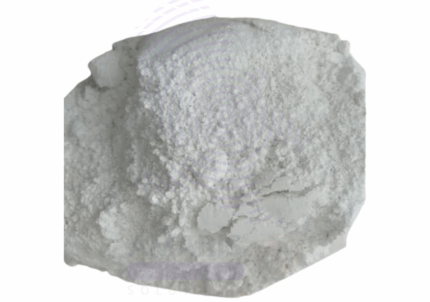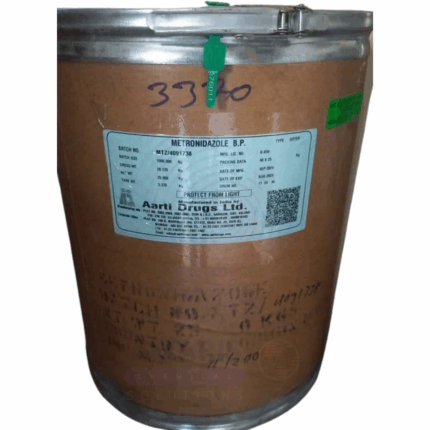Pyrimethamine HCL Micronised
Whatsapp Order
Pyrimethamine HCL Micronised is a finely ground form of pyrimethamine hydrochloride, an antimalarial and antiparasitic drug. The micronised form enhances bioavailability by improving dissolution rate and absorption. It acts by inhibiting dihydrofolate reductase, interfering with folic acid metabolism in protozoa and some bacteria, thus effectively treating malaria and toxoplasmosis. This pharmaceutical-grade compound is used primarily in combination therapies for parasitic infections.
Description
Table of Contents
Toggle
Pyrimethamine HCL Micronised
Primary Uses
- Pharmaceutical Industry
- Used as an active pharmaceutical ingredient (API) in antimalarial medications, often combined with sulfadoxine (e.g., Fansidar) for treating Plasmodium falciparum malaria.
- Employed in the treatment of toxoplasmosis, especially in immunocompromised patients.
- Utilized in combination therapy for other parasitic infections sensitive to folate pathway inhibition.
Secondary Uses
- Veterinary Medicine
- Used in veterinary antiparasitic formulations for protozoal infections in animals.
- Research & Development
- Utilized in pharmaceutical research for new antimalarial drug development and formulation studies.
- Used as a reference standard in analytical and pharmacokinetic studies.
KEY PRODUCT FEATURES
1. Basic Identification Attributes
- Chemical Name (IUPAC): 5-(4-chlorophenyl)-6-ethylpyrimidine-2,4-diamine hydrochloride
- Common/Trade Name: Pyrimethamine HCL Micronised
- CAS Number: 145-62-8
- HS Code: 2933.99.90
- Synonyms: Daraprim (brand name), Pyrimethamine hydrochloride
2. Physical & Chemical Properties
- Physical State: Fine white to off-white powder
- Solubility: Slightly soluble in water; soluble in dilute acids
- Particle Size: Micronised for enhanced dissolution
- Molecular Weight: 248.7 g/mol (free base), hydrochloride salt varies slightly
- Odor & Color: Odorless; white powder
3. Safety & Hazard Attributes
- GHS Classification: Harmful if swallowed; may cause skin and eye irritation
- Toxicity: Moderate toxicity; handle with care to avoid exposure
- Exposure Limits: Follow pharmaceutical safety guidelines
4. Storage & Handling Attributes
- Storage Conditions: Store in a tightly closed container in a cool, dry, and well-ventilated area protected from light
- Container Type: Sealed plastic or glass containers, foil-lined bags
- Shelf Life: Typically 2–3 years if stored properly
- Handling Precautions: Use gloves, mask, and eye protection; avoid dust inhalation
5. Regulatory & Compliance Attributes
- Complies with USP/NF monograph for pyrimethamine hydrochloride
- Manufactured under GMP conditions for pharmaceutical use
6. Environmental & Health Impact
- Biodegradability: Not readily biodegradable
- Ecotoxicity: Toxic to aquatic organisms at high concentrations
- Bioaccumulation: Not significant
SAFETY HANDLING PRECAUTIONS
Safety Handling Precautions
- PPE Required: Gloves, dust mask, goggles recommended
- Handling Guidelines: Use in well-ventilated areas; avoid skin and eye contact
- Storage Measures: Keep containers tightly closed and stored in a dry, cool environment away from light
First Aid Measures
- Inhalation: Move to fresh air; seek medical attention if symptoms develop
- Skin Contact: Wash with soap and water; seek medical advice if irritation persists
- Eye Contact: Rinse with plenty of water for 15 minutes; seek medical attention if irritation continues
- Ingestion: Do not induce vomiting; seek immediate medical attention
Firefighting Measures
- Fire Hazards: Not highly flammable but may decompose on heating releasing toxic fumes
- Extinguishing Media: Use water spray, foam, dry chemical, or CO₂
- Special Precautions: Wear protective clothing and self-contained breathing apparatus
- Hazardous Combustion Products: Carbon oxides, nitrogen oxides, hydrogen chloride
Related products
Diclofenac Sodium BP
Diclofenac Sodium is a nonsteroidal anti-inflammatory drug (NSAID) widely used for its potent analgesic, anti-inflammatory, and antipyretic properties. It is the sodium salt form of diclofenac, providing enhanced solubility and rapid absorption. Diclofenac Sodium BP (British Pharmacopoeia standard) ensures pharmaceutical-grade purity and compliance with stringent quality standards. It is commonly formulated in oral tablets, topical gels, injections, and ophthalmic preparations.
Doxycycline Hyclate BP
Doxycycline Hyclate BP is a broad-spectrum, semisynthetic tetracycline-class antibiotic available as the hemihydrate salt form of doxycycline. It is widely used in pharmaceutical formulations due to its high bioavailability, broad antibacterial activity, and favorable pharmacokinetic profile. The compound exhibits bacteriostatic action by inhibiting protein synthesis in susceptible bacteria, making it effective against a wide range of Gram-positive and Gram-negative organisms as well as atypical pathogens. It is typically supplied as a fine, white to off-white crystalline powder soluble in water and suitable for oral and parenteral dosage forms.
Enrofloxacin Hydrochloride
Enrofloxacin Hydrochloride is a broad-spectrum fluoroquinolone antibiotic used primarily in veterinary medicine. It is the hydrochloride salt of enrofloxacin, offering enhanced solubility and bioavailability. Enrofloxacin inhibits bacterial DNA gyrase and topoisomerase IV, disrupting DNA replication in Gram-negative and Gram-positive organisms as well as some Mycoplasma species. It is available as a white to off-white crystalline powder, used in injectable, oral, and topical formulations designed for livestock, companion animals, and aquatic species.
Hydrocortisone Base BP 93 Micro
Hydrocortisone Base BP 93 Micro is a highly purified, micronized form of hydrocortisone base compliant with British Pharmacopoeia (BP) standards. It is a white to off-white fine powder designed for enhanced solubility and bioavailability in pharmaceutical formulations. As a corticosteroid hormone analog, it exhibits potent anti-inflammatory, immunosuppressive, and anti-allergic activities. The micronized particle size (~93 microns) facilitates improved dispersion in topical, injectable, and oral dosage forms.
Levamisole Hcl BP2000
Levamisole Hcl BP2000 is a white to off-white crystalline powder, soluble in water, with anthelmintic and immunomodulatory properties. It is primarily used as a veterinary antiparasitic agent effective against gastrointestinal nematodes in livestock. Levamisole HCL BP2000 conforms to British Pharmacopoeia standards, ensuring high purity and quality for pharmaceutical and veterinary formulations. Beyond veterinary uses, it is also researched for immunostimulant properties in medical applications.
Mebendazole USP ( Micronized white)
Mebendazole USP (Micronized White) is a pharmaceutical-grade anthelmintic agent used for the treatment of parasitic worm infections. The micronized white powder form offers enhanced bioavailability and better dispersion in pharmaceutical formulations. It is effective against a broad spectrum of intestinal parasites including roundworms, whipworms, hookworms, and pinworms. Mebendazole is commonly used in oral tablet and suspension preparations, ensuring efficient parasite eradication with minimal side effects.
Methyl Salicylate BP
Methyl Salicylate BP is a clear, colorless to pale yellow oily liquid with a characteristic strong, sweet, and minty odor. It is an organic ester commonly used for its analgesic, anti-inflammatory, and flavoring properties. Methyl Salicylate is widely used in pharmaceutical preparations, topical pain relief products, cosmetics, and as a fragrance ingredient.
Metronidazole BP
Metronidazole BP is a benzoate ester derivative of metronidazole, used primarily as an antiprotozoal and antibacterial agent. It is a prodrug that hydrolyzes in the body to release metronidazole, making it more palatable for pediatric and geriatric oral suspensions. It complies with the British Pharmacopoeia (BP) standards for purity and efficacy.


 Preservatives(food)
Preservatives(food) Flavor Enhancers
Flavor Enhancers Acidulants
Acidulants Sweeteners
Sweeteners Antioxidants
Antioxidants Colorants(food)
Colorants(food) Nutraceutical Ingredients (food)
Nutraceutical Ingredients (food) Nutrient Supplements
Nutrient Supplements Emulsifiers
Emulsifiers
 Collectors
Collectors Dust Suppressants
Dust Suppressants Explosives and Blasting Agents
Explosives and Blasting Agents Flocculants and Coagulants
Flocculants and Coagulants Frothers
Frothers Leaching Agents
Leaching Agents pH Modifiers
pH Modifiers Precious Metal Extraction Agents
Precious Metal Extraction Agents
 Antioxidants(plastic)
Antioxidants(plastic) Colorants (Pigments, Dyes)
Colorants (Pigments, Dyes) Fillers and Reinforcements
Fillers and Reinforcements Flame Retardants
Flame Retardants Monomers
Monomers Plasticizers
Plasticizers Polymerization Initiators
Polymerization Initiators Stabilizers (UV, Heat)
Stabilizers (UV, Heat)
 Antifoaming Agents
Antifoaming Agents Chelating Agents
Chelating Agents Coagulants and Flocculants
Coagulants and Flocculants Corrosion Inhibitors
Corrosion Inhibitors Disinfectants and Biocides
Disinfectants and Biocides Oxidizing Agents
Oxidizing Agents pH Adjusters
pH Adjusters Scale Inhibitors( water)
Scale Inhibitors( water)
 Antioxidants(cosmetic)
Antioxidants(cosmetic) Emollients
Emollients Fragrances and Essential Oils
Fragrances and Essential Oils Humectants
Humectants Preservatives
Preservatives Surfactants(cosmetic)
Surfactants(cosmetic) Thickeners
Thickeners UV Filters
UV Filters
 Fertilizers
Fertilizers Soil Conditioners
Soil Conditioners Plant Growth Regulators
Plant Growth Regulators Animal Feed Additives
Animal Feed Additives Biostimulants
Biostimulants Pesticides (Herbicides, Insecticides, Fungicides)
Pesticides (Herbicides, Insecticides, Fungicides)
 Active Pharmaceutical Ingredients (APIs)
Active Pharmaceutical Ingredients (APIs) Excipients
Excipients Solvents(pharmaceutical)
Solvents(pharmaceutical) Antibiotics
Antibiotics Antiseptics and Disinfectants
Antiseptics and Disinfectants Vaccine Adjuvants
Vaccine Adjuvants Nutraceutical Ingredients (pharmaceutical)
Nutraceutical Ingredients (pharmaceutical) Analgesics & Antipyretics
Analgesics & Antipyretics
 Analytical Reagents
Analytical Reagents Solvents(lab)
Solvents(lab) Chromatography Chemicals
Chromatography Chemicals Spectroscopy Reagents
Spectroscopy Reagents microbiology-and-cell-culture-reagents
microbiology-and-cell-culture-reagents Molecular Biology Reagents
Molecular Biology Reagents Biochemical Reagents
Biochemical Reagents Inorganic and Organic Standards
Inorganic and Organic Standards Laboratory Safety Chemicals
Laboratory Safety Chemicals Specialty Laboratory Chemicals(Special Laboratory Equipment)
Specialty Laboratory Chemicals(Special Laboratory Equipment)
 Demulsifiers
Demulsifiers Hydraulic Fracturing Fluids
Hydraulic Fracturing Fluids Scale Inhibitors(oil)
Scale Inhibitors(oil) Surfactants(oil)
Surfactants(oil) Drilling Fluids
Drilling Fluids
 Dyes and Pigments
Dyes and Pigments Bleaching Agents
Bleaching Agents Softening Agents
Softening Agents Finishing Agents
Finishing Agents Antistatic Agents
Antistatic Agents
 Admixtures
Admixtures Waterproofing Agents
Waterproofing Agents Sealants and Adhesives
Sealants and Adhesives Curing Compounds
Curing Compounds Concrete Repair Chemicals
Concrete Repair Chemicals Anti-Corrosion Coatings
Anti-Corrosion Coatings
 Surfactants(cleaning)
Surfactants(cleaning) Builders
Builders Enzymes
Enzymes Solvents (Cleaning)
Solvents (Cleaning) Fragrances
Fragrances
 Electronic Chemicals
Electronic Chemicals Catalysts
Catalysts Lubricants
Lubricants Photographic Chemicals
Photographic Chemicals Refrigerants
Refrigerants Automotive chemicals
Automotive chemicals Pyrotechnic Chemicals
Pyrotechnic Chemicals
 Biodegradable Surfactants
Biodegradable Surfactants Bio-based Solvents
Bio-based Solvents Renewable Polymers
Renewable Polymers Carbon Capture Chemicals
Carbon Capture Chemicals Wastewater Treatment Chemicals
Wastewater Treatment Chemicals
 Pigments
Pigments Solvents(paint)
Solvents(paint) Specialty Coatings
Specialty Coatings Binders/Resins
Binders/Resins Additives
Additives Driers
Driers Anti-Corrosion Agents
Anti-Corrosion Agents Functional Coatings
Functional Coatings Application-Specific Coatings
Application-Specific Coatings
 Fresh Herbs
Fresh Herbs Ground Spices
Ground Spices Whole Spices
Whole Spices Spice Blends
Spice Blends Dried Herbs
Dried Herbs
 Leavening Agents
Leavening Agents Dough Conditioners
Dough Conditioners Flour Treatments
Flour Treatments Fat Replacers
Fat Replacers Decoratives
Decoratives Preservatives(baking)
Preservatives(baking)
 Plasticizers & Softeners
Plasticizers & Softeners Reinforcing Agents
Reinforcing Agents Adhesion Promoters
Adhesion Promoters Vulcanizing Agents
Vulcanizing Agents Antidegradants
Antidegradants Blowing Agents
Blowing Agents Fillers & Extenders
Fillers & Extenders Accelerators & Retarders
Accelerators & Retarders